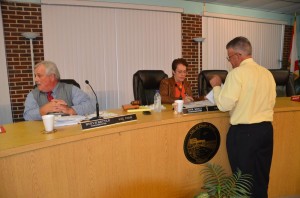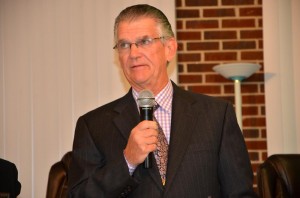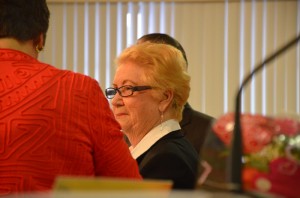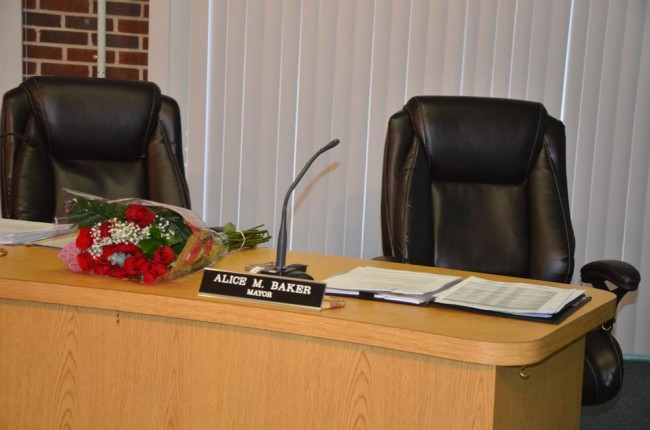
The Flagler Beach City Commission and an appreciative crowd of family members, friends, and the local version of Roman citizens (Flagler Beach’s version being almost as passionate as the original republic’s) bid John Feind and Alice Baker farewell Thursday afternoon, thanking them for a combined decade and a half service between them on the commission. Feind has been a commissioner for nine years (he was first elected in March 2003), Baker was mayor for the last six. She’d worked almost a quarter century for the city, going back to her days in the city administration.

In what was technically a separate meeting, the commission then saw Joy McGrew sworn in as a commissioner for the second time, after a break of less than a year, and Linda Provencher sworn in as mayor, after serving two terms as commissioner until two years ago.
It was then time for the commission to choose its new chairman, Feind having been its last. Those proceedings immediately illustrated what may be the new dynamics of the commission.
Commissioner Kim Carney nominated Steve Settle. Settle seconded his own nomination. Last year, he said, he’d been nominated to be chairman, but turned down the offer. He wasn’t doing so this year, he said. He wanted the chairmanship to rotate. He wanted to be chairman—a position he hasn’t yet held. But when other nominations were entertained, Marshal Shupe nominated Jane Mealy, who had been chairman two years ago. McGrew seconded. When the votes were taken, Mealy got three votes, Settle got two. Mealy was the new chairman. On this commission, there are no greater rivals than Settle and Mealy, who have a habit of antagonizing each other.
The nomination for the vice-chairmanship followed almost the same scenario, with one twist. Carney nominated Settle. Shupe nominated McGrew. But McGrew, in an olive branch characteristic of her pragmatism, voted for Settle, giving him the third vote. Settle is the vice chairman, and will likely be chairman next year.

City Manager Bruce Campbell recognized Baker—whose support was key when Campbell was seeking the top job—as “the city’s memory, storyteller and advisor.” Baker protected the city’s unique character and charm, Campbell read from a proclamation, and proved to be “an exemplary and invaluable addition to our community, as well as an important resource, advocate and friend.” The manager was equally laudatory of Feind, who, as chairman of the commission the last two years, “consistently honored the citizens’ right to speak on all agenda items.”
Feind and Baker got two or three standing ovations from the three dozen-odd people in the room, including two county commissioners (Barbara Revels, who represents Flagler Beach, and Nate McLaughlin, who represents the west side of the county. Craig Coffey, the county administrator, had planned to be in attendance but was delayed, and gave his congratulations during a break.)
The farewell wouldn’t have been complete without one last bookend: a poem by Stan Drescher, Flagler Beach’s poet laureate. Drescher wasn;t there, but he had Carney read the poem—“Mayor Alice Baker, the Gal Who Did It All.” As always, the poem was almost as lengthy as a Bill Clinton State of the Union address, so quoting it in full might strain most computer memory drives, so the last four stanzas (of 33) will have to do:

Alice Baker to us all
Was an institution
And it will be tough to find
A good substitution
It’s very hard to step down
Alice is no quitter
And ‘tho she is a legend
It’s sweet but not bitter
So let us picture Alice
As her parade goes on
She’s still in front as always
But now waves a baton
You’ve given much to all of us
It’s so hard thanking you
But since that’s impossible
We’ll wave and bid adieu.































Leave a Reply